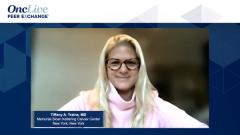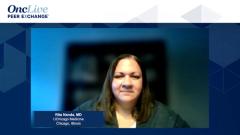
Therapeutic Advances in Prophylaxis Against CIN
An overview of therapies used as prophylaxis against chemotherapy-induced neutropenia and projections on improving quality of life for patients with solid tumors with therapeutic advances.
Episodes in this series

Hope S. Rugo, MD, FASCO: We’ve talked about some really interesting areas today. I appreciate everybody’s thoughts and input, and I think I’ve learned a lot about managing CIN [chemotherapy-induced neutropenia], this new interesting agent, a SIMBA [selective immunomodulating microtubule binding agent], as well as some of the other studies that are going on and the approval of trilaciclib. As we conclude, I’d like to get a final thought from each of you, a few sentences, just about where you think we are with this and where we’re going. Bill?
William J. Gradishar, MD: When we first became acquainted with this drug, it was seen as something that was going to have an impact on neutropenia alone, which translates into the quality of life. But as we get more into the story, I think perhaps there is an anticancer effect or contribution, which would be great, and I hope it’s widely applicable, not just in breast cancer or lung cancer but in all malignancies. What we lack right now is more data.
Hope S. Rugo, MD, FASCO: And Rita?
Rita Nanda, MD: To echo what Bill has said, quality of life for our patients regardless of whether they have early stage or advanced stage disease, the convenience of their therapy, and convenience of supportive care are all critical as we think about what we want to incorporate for our patients moving forward. I have to say as someone interested in immunotherapy and the role immunotherapy is going to play in both advanced and now early stage disease, the potential for some synergy with our checkpoint inhibitors could also be another area of investigation. Now that we’ve got approval for immunotherapy in the early stage disease with a pretty hefty chemotherapy regimen, can we incorporate this into our weekly regimens, and how? Does it need to be given weekly? Can it still be given every 3 weeks? I’d love to see some studies around that both in terms of the anticancer properties, as well as how can it be incorporated into a weekly regimen? Because that is obviously an area of high unmet need, where we’re giving growth factor constantly or changing the schedule up, and we don’t know how all that is going to impact outcomes. I’d like to see more data in that space because I think that there’s a potential there to expand how this drug may be used.
Hope S. Rugo, MD, FASCO: Great. Tiffany?
Tiffany A. Traina, MD: I’m echoing what you’ve heard already. I think that it is somewhat humbling to realize that there’s a lot we don’t understand. It really calls to the value of investigation and science. I remember memorizing the definition of serendipity when I was a kid; it was the gift of finding valuable things not sought after. That sums it up, finding this sort of serendipitous benefit that may be efficacy, when we were just trying to do right by our patients, and help neutropenia and supportive care. I think that’s a fantastic story, and I hope we see it through.
Hope S. Rugo, MD, FASCO: Excellent points and a really a fascinating discussion about an area that we thought we had wrapped up and clearly don’t. There are a lot of exciting new things to look for going forward. We learned about a new agent as well as the areas we might have not remembered, how we’re actually managing neutropenia, understanding risks at present, and what the future might hold.
Thanks to Bill, Rita, and Tiffany for participating, and for your excellent points and discussion. Thank you again to our viewing audience. We hope you found this OncLive® Peer Exchange discussion to be useful and informative, and we hope to see you again.
Transcript edited for clarity.






































